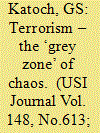| Srl | Item |
| 1 |
ID:
146940


|
|
|
| 2 |
ID:
164247


|
|
|
|
|
| Summary/Abstract |
This article looks at Nepal’s Buffer State predicament and the path that India and Nepal must follow to meet the national interests of both countries. The rise of Nepalese nationalism with a communist complexion and the rise of China, which seeks to expand its sphere of influence, have led to Nepal being pushed into what can be called as the “New Small Game”.China’s growing profile in the Himalayan country is a threat to India’s security interests and India has to be proactive to maintain the buffer status of Nepal. The Nepalese economic situation and sovereignty issues have motivated Nepal to seek help from China for meeting its infrastructural and transportation needs. However, the geographical advantage that India provides to Nepal for land transportation access can still not be matched by China which will affect Nepal’s strategic calculations. The demand for modification to the Indo-Nepal Treaty of 1950 is fallout of assertion of sovereignty and an unreal threat of being swamped by Indian immigrants. So far, the Nepalese have demonstrated remarkable understanding and good diplomatic skills to balance between two antagonistic neighbours. However, the planned Chinese land road/rail connectivity across the Himalayas increases India’s insecurity as it dilutes the buffer status. India cannot stop Nepal from seeking Chinese assistance. On its part Nepal has to balance its needs with the advantages of a neutral buffer. Perhaps with strict neutrality Nepal can become for the subcontinent what Switzerland was for Europe. India must help Nepal to achieve this and remain an effective buffer.
|
|
|
|
|
|
|
|
|
|
|
|
|
|
|
|
| 3 |
ID:
169698


|
|
|
|
|
| Summary/Abstract |
The Act East Policy (AEP) was brought in by the Narendra Modi government as an evolution to the Look East policy of the PV Narasimha Rao’s government in 1991. The evolution was required due to change in strategic and economic environment in over two decades since the enunciation of the first policy. through the AEP India must strengthen its relations and cooperation with other East Asian regional powers as well as Japan, South Korea and Australia. As China’s military strength and presence in Asia grows and it starts to flex its muscles so should the efforts by India and other powers to create a military and strategic counterweight in response.
|
|
|
|
|
|
|
|
|
|
|
|
|
|
|
|
| 4 |
ID:
164120


|
|
|
|
|
| Summary/Abstract |
The requirement of having some rules and laws under which war should be conducted emerged consequent to the Geneva Convention of 1864 which was basically about the “Amelioration of the Condition of the Wounded and Sick in Armed Forces in the Field”. It was only in the 1899 Hague Conference that codification of the laws of war on land, as the “Hague Conventions 1899” was undertaken. The wars post that convention used the rules that emerged, to interpret the “Jus in Bello” concept or the “Just way to wage war”. While these were infringed many times, however, the laws did rein in truant states and permitted trials of war criminals. In a short period of less than a century since the laws emerged, countries and organisations had learnt to circumvent the rules in the form of proxy wars and terrorism. In this milieu conflict is waged in a zone where the rules can be twisted and misinterpreted or waged in a manner that neither do they follow the law, nor (legally) do they infringe it. Conflict is no longer black or white, it is opaque, it is in the “Grey Zone”.
|
|
|
|
|
|
|
|
|
|
|
|
|
|
|
|